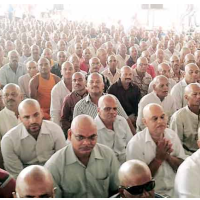Jains Reject High Court Order Against Ritual Fast Unto Death
 Thousands of Jains have tonsured their heads in protest (photo: Indian Express)
Thousands of Jains have tonsured their heads in protest (photo: Indian Express)
A tradition of Jains starving themselves to death is an essential part of religious freedom, a petition told the Supreme Court on Tuesday, as the community protested its voluntary custom of ‘santhara’ being declared illegal by the Rajasthan High Court.
The High Court ruled on August 10 that santhara is a form of suicide and therefore illegal. In response, thousands of Jains held a demonstration in Jaipur and other cities on Monday, carrying banners that read "Suicide is crime. Santhara is religion." In many places, Jains chose to tonsure their heads as a form of protest.
As part of their religion, Jains can take a vow to give up food and water as a way of embracing death. It is unclear how many deaths occur every year, but media reports put the number at over 400.
The High Court verdict was based on a petition filed in 2006 by activist Nikhil Soni who argued the practice violated the Indian prohibition of suicide. He questioned whether elderly Jains were being encouraged to take the vow to free families of the burden of taking care of them, an argument that Jains deny.
“Why is it that only those people who are ill and on the verge of death are opting for santhara?” Soni asked documentary filmmaker Shekhar Hattangadi. “Is it that it’s being imposed on them?”
In cases where the individual clearly wishes to die, supporting the fast amounts to abetting suicide, which is a crime in India, Soni’s lawyer Madhav Mitra said in an interview.
According to the New York Times, this is a thorny constitutional question for India, which enshrines the right to both life and religious practice.
The High Court judgement has already been challenged in the Supreme Court. On Tuesday, Jain leaders filed another petition, arguing that "Santhara is an integral part of the Jain religion and the court can't interfere with its customs".
Santhara was first mentioned in texts written more than 1,500 years ago and derives from a word in the ancient Prakrit language meaning “bed of grass.” An individual wishing to take the fast unto death must first get an approval from a guru and family members. According to Jain religious doctrine, the ritual allows the spirit to break free from the cycle of rebirth and death.
While the community is mobilizing to appeal the High Court’s decision, families are no longer publicizing their relatives’ fasts the way they once did, with advertisements in newspapers and posters guiding pilgrims to their homes.
Babulal Jain Ujjwal, who publishes an annual newsletter on Jain affairs from Mumbai, said an average of 450 fasts took place annually over the last six years, but this had dropped off sharply in the past few months, perhaps because families were keeping them secret.
“Santharas are happening, there is no doubt about that, but they are happening quietly,” he told the New York Times.
To Learn More:
Sect’s Death Ritual Clashes With Indian Law (by Ellen Barry and Mansi Choksi, New York Times)
Fasting Unto Death is Essential Religious Freedom, Say Jains in Court (by A. Vaidyanathan, NDTV)
Jains hold nationwide protest marches against 'Santhara' ban (Hindustan Times)
Doc firm on Santhara despite HC ban: I too want a beautiful death (Indian Express)
Santhara in the eyes of the law (by Shekhar Hattangadi, The Hindu)
- Top Stories
- Controversies
- Where is the Money Going?
- India and the World
- Appointments and Resignations
- Unusual News
- Latest News
- India College Chain’s Expansion into U.S. Draws Opposition from Massachusetts Officials over Quality of Education
- Milk Shortages in India Tied to Release of New Movies Featuring Nation’s Favorite Stars
- Confusion Swirls around Kashmir Newspaper Ban in Wake of Violent Street Protests
- Polio-Free for 5 Years, India Launches Vaccine Drive after Polio Strain Discovery
- New Aviation Policy Could Increase Service, Lower Ticket Prices






Comments